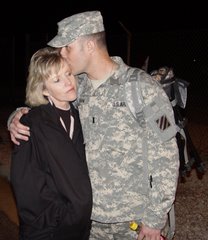
Lt. Col. Ryan Kuhn, from Clarks, Neb., deputy commanding officer of the 3rd Heavy Brigade Combat Team, talks with Jabar Abed Khaji, director general of water for the Ministry of Water, from Baghdad, and Mushen Nasser, mayor of the Mada’in Qada, to discuss water projects in the qada Feb. 19, at the al Bawi water treatment facility.
 Leaders of the Mada’in Qada and the 3rd Heavy Brigade Combat Team, including Lt. Col. Ryan Kuhn, from Clarks, Neb., deputy commanding officer of the 3rd HBCT, and Mushen Nasser, the qada mayor, feast at the al Bawi water treatment facility Feb. 19 during a visit from Jabar Abed Khaji, director general of water for the Ministry of Water, from Baghdad.
Leaders of the Mada’in Qada and the 3rd Heavy Brigade Combat Team, including Lt. Col. Ryan Kuhn, from Clarks, Neb., deputy commanding officer of the 3rd HBCT, and Mushen Nasser, the qada mayor, feast at the al Bawi water treatment facility Feb. 19 during a visit from Jabar Abed Khaji, director general of water for the Ministry of Water, from Baghdad.
 Leaders of the Mada’in Qada and the 3rd Heavy Brigade Combat Team, including Lt. Col. Ryan Kuhn, from Clarks, Neb., deputy commanding officer of the 3rd HBCT, and Mushen Nasser, the qada mayor, feast at the al Bawi water treatment facility Feb. 19 during a visit from Jabar Abed Khaji, director general of water for the Ministry of Water, from Baghdad.
Leaders of the Mada’in Qada and the 3rd Heavy Brigade Combat Team, including Lt. Col. Ryan Kuhn, from Clarks, Neb., deputy commanding officer of the 3rd HBCT, and Mushen Nasser, the qada mayor, feast at the al Bawi water treatment facility Feb. 19 during a visit from Jabar Abed Khaji, director general of water for the Ministry of Water, from Baghdad.By Sgt. Natalie Rostek
3rd HBCT, 3rd Inf. Div. PAO
FORWARD OPERATING BASE HAMMER, Iraq – Almost five years had passed since a Ministry of Water representative visited the Mada’in Qada, the 3rd Heavy Brigade Combat Team’s area of operation.
On Feb. 19, Jabar Abed Khaji, director general of water for the Ministry of Water, traveled from Baghdad to the qada, approximately 20 miles south of the Iraqi capital. He met with Lt. Col. Ryan Kuhn, from Clarks, Neb., deputy commanding officer of the 3rd HBCT, and Mushen Nasser, mayor of the Mada’in Qada, to tour two water treatment facilities.
“The Mada’in Qada hasn’t had a lot of water resources in the last couple of years due to security,” Kuhn said. “Coalition forces, Iraqi security forces and the Sons of Iraq have improved security to such a level that the director general came to the area.”
The first stop was the Tuwaitha water treatment facility where they met with Maj. Andrew Koloski, from Yuma, Alaska, executive officer of the 3rd Squadron, 1st Cavalry Regiment, for an outdoor discussion about the facility.
“In July, we were fighting over this area and could not have held this meeting out in the open without serious risk of sniper or mortar fire,” Koloski said. “Since the national police, Sons of Iraq and coalition forces have worked together to bring security, the Government of Iraq is able to begin restoring essential services.”
The GoI has contributed to restoration of the facility and Koloski said the available supply of treated drinking water in the area will double with the restoration.
“Today’s visit with Jabar was huge,” he said. “It means a great deal to the people out here that the government in Baghdad is taking an interest in them.”
The soldiers, Nasser, Jabar and Mr. Raad, lead engineer in Baghdad, next traveled to al Bawi to assess the water treatment facility.
According to 1st Lt. Ryan Martin, leader of the 3rd HBCT economics team, the al Bawi water treatment facility is only 25 percent functional. A reconstruction project for the facility was proposed to Jabar.
“I don’t care how much it takes,” Jabar said through a translator. “We are going to do this so the city can have drinking water.”
Martin said the GoI will spend approximately $1.2 million on the 120-day project to fix the facility. Cosmetic refurbishment has already begun.
“Rebuilding the facility is only the first step,” Martin said. “It still needs to be staffed and maintained. The DG will ensure all the needs of the facility are met.”
The two water treatment facilities will produce clean drinking and irrigation water for the entire Mada’in Qada. Using chemicals and reverse osmosis, raw water will be taken from the Tigris River, treated and turned into clean drinking water that will be pumped to 90 percent of the qada, Kuhn said.
“After the Government of Iraq fixed the al Bawi pump station, four times more water was being pumped from the Tigris,” Kuhn said. “There were levels of water the people had not seen in years."
“Projects like these put the insurgents on notice that their days of trying to manipulate and control the water in the area are over,” he said. “In the first meeting we had with the qada mayor and council, we said we were going to restore the irrigation and drinking water. Over the past 12 months we have completed over 40 water projects through our partnership with the qada government. This puts great pressure on the insurgents.”
With water comes opportunity, Kuhn said. The Mada’in Qada is a largely agricultural area.
“Water is the substance of life,” he said. “It’s that simple. With water, farmers can work in their fields. They can provide for their families. Water stimulates the economy, which provides jobs, which provides security. Farmers can work and provide for their families so they don’t have to go out and place (improvised explosive devices).”
Kuhn anticipates visits from the director generals of health, electricity and education in the future.
The 3rd HBCT, 3rd Infantry Division, Fort Benning, Ga., has been deployed in support of Operation Iraqi Freedom since March.






No comments:
Post a Comment